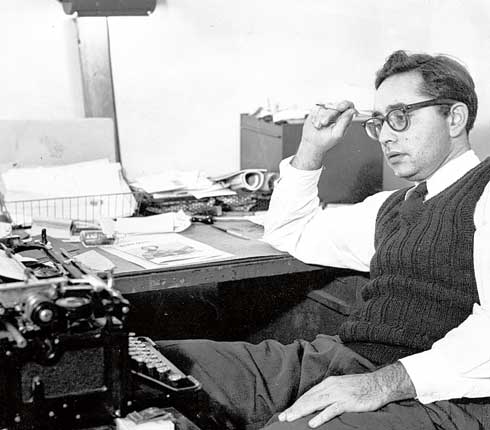Irwin Silber: Music critic whose influence on the US folk scene brought him into conflict with Bob Dylan

Irwin Silber was a towering presence in the US folk scene. He edited Sing Out!, the world's longest-lived folk-music magazine, during one of the folk scene's most critical and fraught periods. Famously, in November 1965, he was at the helm when he publicly griped in its pages about Bob Dylan's "reneging" on his protest-song pact and playing amplified music – plus damning him in passing for being seduced by fame. Some commentators later fingered him as the object of Dylan's most bilious piece of vitriol.
Silber was born on Manhattan's Lower East Side in 1925. Somewhat precocious, having skipped several grades, he graduated from high school aged 15. While majoring in English and American history at Brooklyn College between 1941 and 1945, he went through a series of folk-related experiences. In the welter of the times they included Margot Mayo's American Square Dance Group and, far to its left, American Folksay, the singing and folk-dancing group that he co-founded and that put on Silber's folk plays Circle Left and Tomorrow Is Good Morning. He also experienced the radical Camp Wo-Chi-Ca, a gathering with an ersatz Indian-sounding name derived from Workers Children's Camp, and most especially, the Almanac Singers. This forerunner of The Weavers had a floating membership of, among others, Woody Guthrie, Butch Hawes, Bess Lomax Hawes, Pete Seeger and Josh White.
Aside from calling square dances, Silber did not perform. His political activism found other outlets. He was at the forefront of People's Songs, formed in 1945, which published songs and articles and supported the Henry Wallace presidential campaign. Its demise led to the founding of Sing Out! Its launch editor, in 1950, was Robert Wolfe; by 1951, Silber had replaced him.
The musician and author Dick Weissman tersely described Silber as "a sort of cultural commissar and self-appointed conscience of the folk-song movement". He remained the editor of Sing Out! until May 1967 when, as Happy Traum explains, he "sold his stock in Sing Out! to a group of close colleagues and musicians – myself included – in order to extricate himself from the burdens of ownership. Although he remained on as editor for several more issues, he eventually turned the magazine's duties over to an "editorial executive board" consisting of Julius Lester, Paul Nelson, Ethel Raim, Irwin and myself."
Overshadowing his time as champion of US folk music is that much talked-up feud – "the angry letter" as Dylan calls it in Chronicles – Volume One (2004). At the Newport Folk Festival of July 1965 Dylan had unleashed the driving frenzy of "Maggie's Farm", "Like a Rolling Stone" and "It Takes a Lot to Laugh, It Takes a Train to Cry". To many, it seemed that political song had lost its second coming. "Your new songs seem to be inner-directed now, inner-probing, self-conscious – maybe even a little maudlin or a little cruel on occasion," wrote Silber. He was spot-on, but the feud is what people remember, assisted by speculation about Dylan's inspiration for "Positively 4th Street" when he wrote: "You got a lotta nerve/ To say you are my friend/ When I was down/ You just stood there grinning".
More likely, Dylan rode the mood that the criticism engendered and turned it into something positive – one of his most articulate songs.
"Irwin couldn't care less about the acoustic/electric debate," Barbara Dane explains. "He was so respectful of, and excited by Dylan's work like "Masters of War", "Hard Rain's...", "Hattie Carroll", "Pawn in their Game" etc, and feared that we – the peace and justice movements – were losing him to the navel-gazers then populating the singer/songwriter world." Similarly, the received opinion is that Dylan, in a fit of pique, severed ties with Sing Out! – he never did. As its current editor, Mark Moss, explains, "I guess none of that stuff fits the more interesting narrative of intractable feuds."
Among other writings, Silber collaborated on the highly important songbook Hard-Hitting Songs for Hard-Hit People (1967), Vietnam Songbook (1969) with Dane, and, something of a departure, A Patient's Guide to Knee and Hip Replacement (1999). He also contributed to Oak Publications releases, such as his foreword to its Ewan MacColl-Peggy Seeger Songbook (1963).
Silber and Dane actively supported socially engaged song-makers and musicians through their label Paredon Records, founded in 1970. These recordings ran the gamut from Dane's I Hate the Capitalist System (1973) and Huey Newton Speaks (1970) to Palestine Lives!: Songs from the Struggle of the People of Palestine (1974) (various artists) and Leon Rosselson and Roy Bailey's Songs of Life from a Dying British Empire (1981). In 1991 they donated their recordings to the Smithsonian Folkways archive.
In addition to his first and third wives, he is survived by Josh, Fred and Nina Silber from his first marriage and three stepchildren, Nina Menendez, Pablo Menendez and Jesse (Nick) Cahn.
Irwin Silber, writer, editor, publisher and political activist: born Manhattan, New York 17 October 1925; married firstly Roz Bernstein (divorced), secondly Sylvia Kahn Silber (deceased, two sons, one daughter), thirdly Barbara Dane; died Oakland, California 8 September 2010.
Join our commenting forum
Join thought-provoking conversations, follow other Independent readers and see their replies
Comments
Bookmark popover
Removed from bookmarks